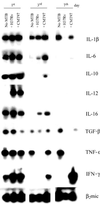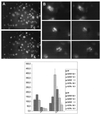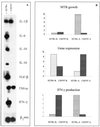Human macrophage gamma interferon decreases gene expression but not replication of Mycobacterium tuberculosis: analysis of the host-pathogen reciprocal influence on transcription in a comparison of strains H37Rv and CMT97
- PMID: 11705896
- PMCID: PMC98810
- DOI: 10.1128/IAI.69.12.7262-7270.2001
Human macrophage gamma interferon decreases gene expression but not replication of Mycobacterium tuberculosis: analysis of the host-pathogen reciprocal influence on transcription in a comparison of strains H37Rv and CMT97
Abstract
Mycobacterium tuberculosis is an intracellular pathogen that readily survives and replicates in human macrophages (MPhi). Host cells have developed different mycobactericidal mechanisms, including the production of inflammatory cytokines. The aim of this study was to compare the MPhi response, in terms of cytokine gene expression, to infection with the M. tuberculosis laboratory strain H37Rv and the clinical M. tuberculosis isolate CMT97. Both strains induce the production of interleukin-12 (IL-12) and IL-16 at comparable levels. However, the clinical isolate induces a significantly higher and more prolonged MPhi activation, as shown by reverse transcription-PCR analysis of IL-1beta, IL-6, IL-10, transforming growth factor beta, tumor necrosis factor alpha, and gamma interferon (IFN-gamma) transcripts. Interestingly, when IFN-gamma transcription is high, the number of M. tuberculosis genes expressed decreases and vice versa, whereas no mycobactericidal effect was observed in terms of bacterial growth. Expression of 11 genes was also studied in the two M. tuberculosis strains by infecting resting or activated MPhi and compared to bacterial intracellular survival. In both cases, a peculiar inverse correlation between expression of these genes and multiplication was observed. The number and type of genes expressed by the two strains differed significantly.
Figures



Similar articles
-
Secreted Rv1768 From RD14 of Mycobacterium tuberculosis Activates Macrophages and Induces a Strong IFN-γ-Releasing of CD4+ T Cells.Front Cell Infect Microbiol. 2019 Oct 14;9:341. doi: 10.3389/fcimb.2019.00341. eCollection 2019. Front Cell Infect Microbiol. 2019. PMID: 31681622 Free PMC article.
-
Mycobacterium tuberculosis multi-drug-resistant strain M induces IL-17+ IFNγ- CD4+ T cell expansion through an IL-23 and TGF-β-dependent mechanism in patients with MDR-TB tuberculosis.Clin Exp Immunol. 2017 Jan;187(1):160-173. doi: 10.1111/cei.12873. Epub 2016 Nov 2. Clin Exp Immunol. 2017. PMID: 27681197 Free PMC article.
-
Type I IFN induces IL-10 production in an IL-27-independent manner and blocks responsiveness to IFN-γ for production of IL-12 and bacterial killing in Mycobacterium tuberculosis-infected macrophages.J Immunol. 2014 Oct 1;193(7):3600-12. doi: 10.4049/jimmunol.1401088. Epub 2014 Sep 3. J Immunol. 2014. PMID: 25187652 Free PMC article.
-
Lactic acid bacteria enhance autophagic ability of mononuclear phagocytes by increasing Th1 autophagy-promoting cytokine (IFN-gamma) and nitric oxide (NO) levels and reducing Th2 autophagy-restraining cytokines (IL-4 and IL-13) in response to Mycobacterium tuberculosis antigen.Int Immunopharmacol. 2010 Jun;10(6):694-706. doi: 10.1016/j.intimp.2010.03.014. Epub 2010 Apr 7. Int Immunopharmacol. 2010. PMID: 20381647
-
Interferon-γ, tumor necrosis factor, and interleukin-18 cooperate to control growth of Mycobacterium tuberculosis in human macrophages.Cytokine. 2012 Oct;60(1):233-41. doi: 10.1016/j.cyto.2012.06.012. Epub 2012 Jun 29. Cytokine. 2012. PMID: 22749533 Free PMC article.
Cited by
-
Safety and immunogenicity of a new tuberculosis vaccine, MVA85A, in Mycobacterium tuberculosis-infected individuals.Am J Respir Crit Care Med. 2009 Apr 15;179(8):724-33. doi: 10.1164/rccm.200809-1486OC. Epub 2009 Jan 16. Am J Respir Crit Care Med. 2009. PMID: 19151191 Free PMC article. Clinical Trial.
-
Down-regulation of miR-20a-5p triggers cell apoptosis to facilitate mycobacterial clearance through targeting JNK2 in human macrophages.Cell Cycle. 2016 Sep 16;15(18):2527-38. doi: 10.1080/15384101.2016.1215386. Epub 2016 Aug 5. Cell Cycle. 2016. PMID: 27494776 Free PMC article.
-
Innate immunity in tuberculosis: host defense vs pathogen evasion.Cell Mol Immunol. 2017 Dec;14(12):963-975. doi: 10.1038/cmi.2017.88. Epub 2017 Sep 11. Cell Mol Immunol. 2017. PMID: 28890547 Free PMC article. Review.
-
Mycobacteria lacking the RD1 region do not induce necrosis in the lungs of mice lacking interferon-gamma.Immunology. 2006 Oct;119(2):224-31. doi: 10.1111/j.1365-2567.2006.02427.x. Immunology. 2006. PMID: 17005003 Free PMC article.
-
Low induction of proinflammatory cytokines parallels evolutionary success of modern strains within the Mycobacterium tuberculosis Beijing genotype.Infect Immun. 2013 Oct;81(10):3750-6. doi: 10.1128/IAI.00282-13. Epub 2013 Jul 29. Infect Immun. 2013. PMID: 23897611 Free PMC article.
References
-
- Anderson D H, Harth G, Horwitz M A, Heisenberg D. An interfacial mechanism and a class of inhibitors inferred from two crystal structures of the Mycobacterium tuberculosis 30 kDa major secretory protein (antigen 85B), a mycolyl transferase. J Mol Biol. 2001;307:671–681. - PubMed
-
- Bonecini-Almeida M G, Chitale S, Boutsikakis I, Geng J, Doo H, He S, Ho J L. Induction of in vitro human macrophage anti-Mycobacterium tuberculosis activity: requirement for IFN-γ and primed lymphocytes. J Immunol. 1998;160:4490–4499. - PubMed
-
- Busby, S. J. W., M. C. Thomas, and N. L. Brown. 1998. Molecular biology. NATO ASI Ser. Ser. H Cell Biol. 103.
Publication types
MeSH terms
Substances
LinkOut - more resources
Full Text Sources
Research Materials
Miscellaneous

